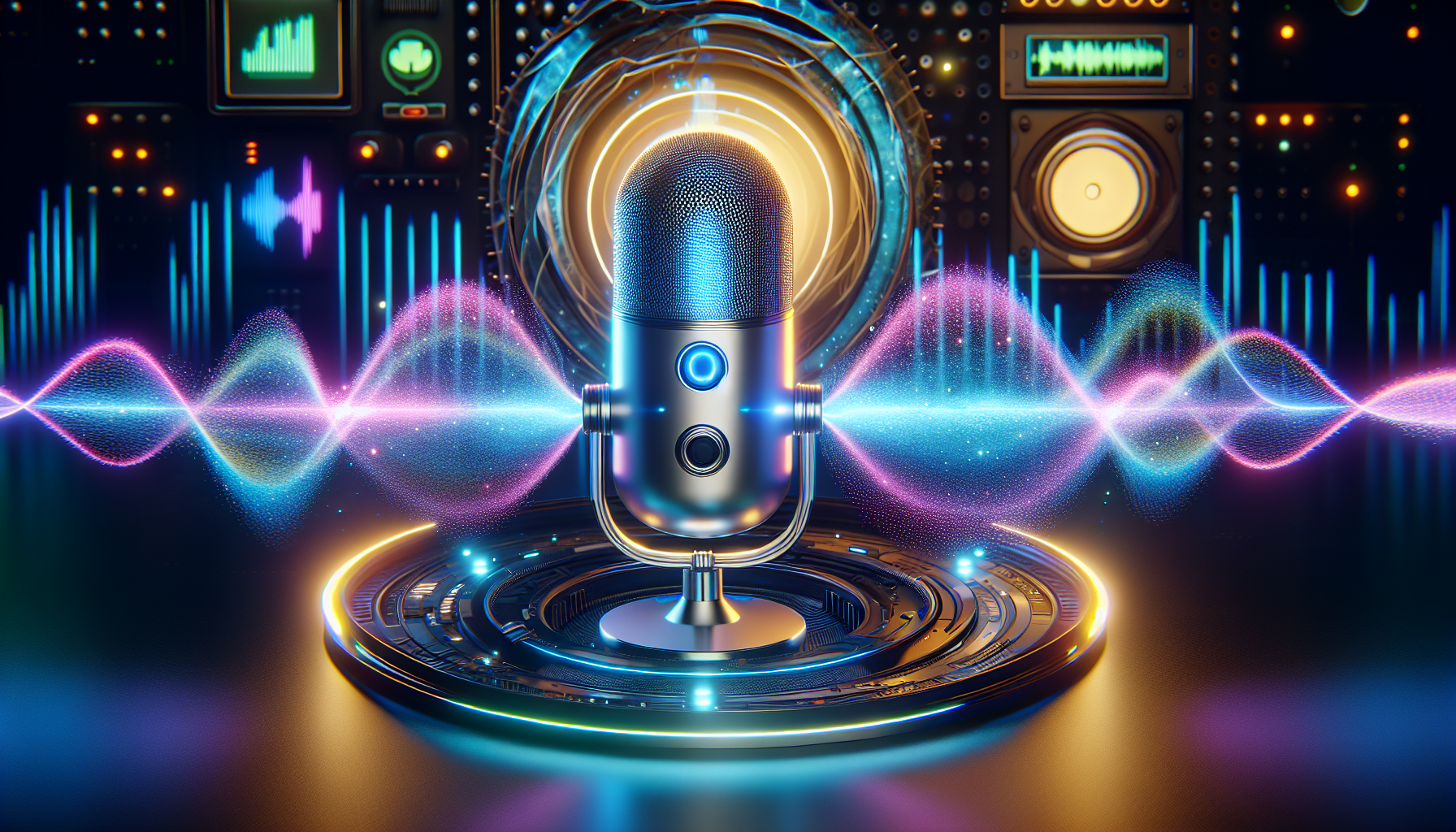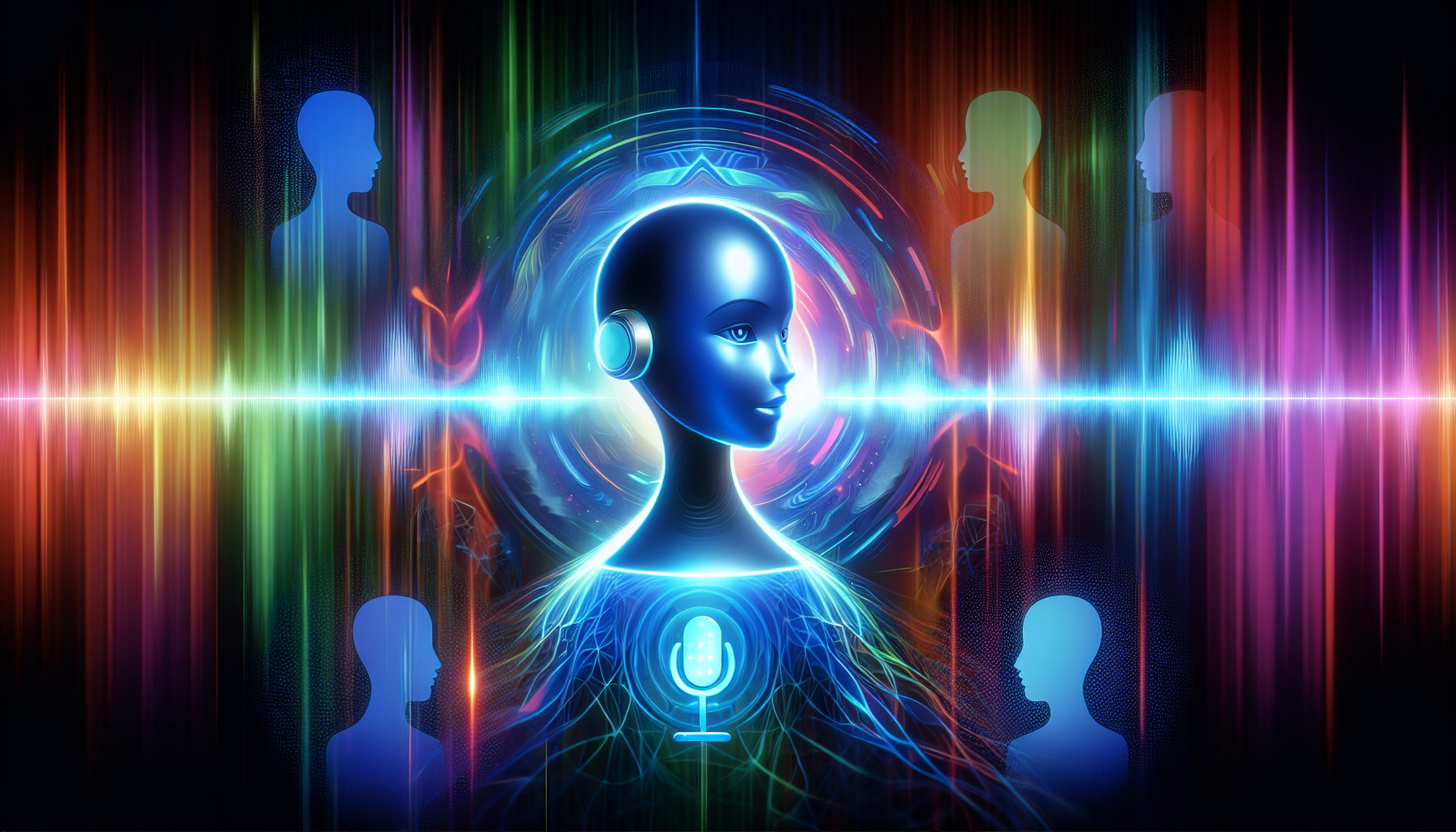Table of Contents
In this article, we’ll show how AI voice tools are changing podcast production by automating tasks, improving audio quality, and making content more accessible. These tools streamline workflows, enhance sound, and open new possibilities for creators.
Key Takeaways
- AI voice tools are impacting podcast production by automating repetitive tasks like transcription, enhancing audio quality, and expanding multilingual capabilities.
- AI-generated voices can create more engaging and lifelike podcast content, saving time and costs on recording while broadening reach to a global audience.
- Ethical considerations are crucial with AI voice technology, requiring consent and transparent use to avoid misuse like impersonation and misinformation.
AI Voice Technology in Podcasting

AI voice technology is making a significant impact in the podcasting world, transforming how content is created, produced, and consumed. With the podcasting market projected to grow from USD 2,200.9 million in 2023 to USD 26,599.1 million by 2033, at a CAGR of 28.3%, it’s clear that the adoption of AI tools is on the rise. This growing trend is driven by the increasing demand for new technology to enhance listening experiences, making podcasts more engaging and accessible to a broader audience.
Podcasters are increasingly turning to AI to streamline their workflows and improve content quality. Around 40% of podcasters are already using AI tools to enhance episodes, focusing on transcription and personalized content generation. AI’s ability to automate repetitive tasks like transcription not only saves time but also broadens access, allowing podcasters to reach a more diverse audience, including those who prefer reading over listening.
One of the most exciting aspects of AI in podcasting is its potential to amplify a brand’s reach. AI-generated podcasts can captivate audiences for extended periods, providing fresh insights and commentary on existing written content. This not only enhances the listening experience but also fosters deeper connections between podcasters and their listeners. As of 2023, AI’s footprint in the podcasting world remains relatively small, but its impact is rapidly growing, paving the way for more innovative and engaging content.
Case Studies: Successful Use of AI Voice Tools in Podcasting
The ‘Global Voices’ podcast is a prime example of how AI voice tools are changing podcasting. By utilizing voice cloning technology, ‘Global Voices’ produces episodes in multiple languages, including:
- English
- Spanish
- Mandarin
- Arabic
This multilingual approach not only broadens the podcast’s reach but also makes it more inclusive and accessible to non-English speaking listeners.
AI transcription services play a crucial role in expanding the accessibility of podcasts. These services accurately transcribe spoken words into text, making content available to individuals who are deaf or hard of hearing, as well as those who prefer reading over listening. Additionally, transcripts can be repurposed into blog posts, social media snippets, or even full books, opening up new monetization opportunities for podcasters.
By using the best AI tools, podcasters can:
- Create high-quality, professional voiceovers
- Resonate with a global audience
- Break down linguistic barriers
- Enhance the overall podcast experience for listeners around the world
The success of ‘Global Voices’ demonstrates the power of AI voice technology in achieving these goals.
Enhancing Audio Quality with AI Voice Generators

High-quality audio is a critical factor in the success of any podcast. AI voice generators utilize advanced machine learning and neural networks to produce speech that mimics human intonation, rhythm, and pronunciation, resulting in natural-sounding AI voices. These voice generators break down text into phonetic components and synthesize them into coherent speech, varying tone, pitch, and speed to closely mimic human characteristics.
Some benefits of using AI voice generators for podcasting include:
- Consistent and professional-sounding audio
- Time-saving, as you don’t need to record your own voice
- Ability to choose from a variety of voices and accents
- Easy editing and post-production
By using AI voice generators, you can enhance the quality of your podcast and provide a better listening experience for your audience.
AI-powered tools can also analyze audio files, such as an audio file, to enhance their quality. For example, AI algorithms can detect and reduce background noise, equalize levels, and clean up audio to remove unwanted artifacts, significantly improving the overall sound quality of a podcast. This automated audio enhancement process reduces the need for extensive manual editing, making it easier and faster for podcasters to produce high-quality content.
Advanced techniques, such as the WaveNet model, allow for the synthesis of raw audio waveforms, resulting in highly expressive and realistic speech. By incorporating emotional tones and variations in speech, AI voice generators can make the generated audio sound more engaging and lifelike. These tools often include features like pronunciation editors, ensuring correct and consistent pronunciation throughout the podcast.
Furthermore, AI’s ability to optimize the distribution of podcasts ensures that they reach the right audience. Machine learning algorithms analyze listeners’ behavior and preferences, allowing podcasters to tailor their content and advertising to specific segments. This not only improves the audio quality but also makes the podcast more relevant and engaging for listeners.
Benefits of AI Voice Generators
AI voice generators produce high-quality, natural-sounding speech.
No need to record your own voice, saving time and effort.
Streamlining Content Creation
Creating a podcast involves numerous tasks, from recording and editing to post-production. AI voice tools significantly streamline this content creation process by automating many of these tasks. By generating speech almost instantaneously, AI voice generators enable rapid updates or creation of new content, which is beneficial for meeting tight deadlines. This efficiency allows podcasters to focus more on content creation and less on the technical aspects of production.
One of the key advantages of AI voice tools is their ability to:
- Reduce the need for extensive editing by providing polished output
- Make podcasts more accessible to a wider audience, including those with hearing impairments or language barriers
- Analyze data and assist creators in generating topics, conducting research, and writing scripts, further streamlining the content creation workflow
Choosing a voice model and generating the voiceover are straightforward steps in AI voice tools, allowing creators to convert scripts into AI-generated voiceovers with just a few clicks. This automation not only saves time but also ensures a superior end product, enhancing the overall quality and appeal of the podcast. By leveraging AI tools, even creators with limited expertise can produce high-quality content efficiently.
Key Advantages of AI Voice Tools
Automate recording, editing, and post-production tasks.
Generate speech almost instantaneously for quick updates.
Reduce the need for extensive editing by providing polished output.
Make podcasts more accessible to a wider audience.
Analyze data to assist in generating topics and writing scripts.
Customizing Voices for Unique Podcasts

AI voice generators offer podcasters the ability to:
- Create unique, branded voices that align with their podcast’s theme
- Provide a variety of realistic, human-like AI voices
- Customize voices to incorporate specific emotions and styles, such as confident, sarcastic, or serious tones
- Craft a distinct voice that resonates with their audience and enhances the overall listening experience.
Podcasters can choose from various styles, accents, and languages to better engage their target audiences. For instance, a podcast focused on global news might use different accents to reflect the diverse regions being discussed, adding authenticity and depth to the content. This flexibility in voice customization not only helps in creating a unique podcast identity but also in building a stronger connection with listeners.
The ability to customize voices extends to language preferences. This enables podcasters to produce content in multiple languages. It helps cater to a global audience. Using the best AI voice generator tools is essential. Podcasters can create captivating audio experiences. These experiences stand out in the crowded podcasting landscape.
Improving Listener Engagement with Natural Sounding Speech
Listener engagement is crucial for the success of any podcast, and natural-sounding AI voices play a significant role in achieving this. The use of advanced AI voices with a wide emotional range and realistic speech characteristics enhances listener engagement. These ultra-realistic voices can adapt to different contexts and tones, providing a seamless and captivating audio experience. As a result, podcasters can create content that not only attracts but also retains their audience, fostering a loyal listener base.
Real-Time Voice Cloning for Dynamic Content

With advancements in voice cloning technology, podcasters can produce more engaging and natural-sounding speech for their episodes. This technology allows for the creation of human-like voices that closely mimic the nuances of natural human speech, making the listening experience more immersive and enjoyable.
AI voice cloning tools also offer features like emphasis and pronunciation editors, enabling podcasters to stress important words and highlight key points in their scripts. This helps in conveying the intended message more effectively and keeps the listeners engaged throughout the episode. By fine-tuning the speech output, podcasters can ensure that the AI generated voices sound as natural and engaging as possible.
Real-time voice cloning technology is taking podcasting to the next level by enabling podcasters to:
- Simulate multiple speakers
- Create dynamic content
- Mimic the nuances of a person’s voice using deep learning algorithms
- Produce dialogues, conversations, and group discussions with realistic voices
This technology enhances the overall storytelling experience for podcast listeners.
The ability to clone voices in real-time opens up new possibilities for creating engaging and interactive content. Podcasters can simulate interviews or panel discussions without the need for multiple voice actors, saving time and resources while maintaining high-quality audio output. This flexibility allows for more creative freedom and dynamic content creation, making podcasts more interesting and diverse.
As voice cloning technology continues to advance, the realism and fidelity of synthesized speech are expected to improve, making it nearly indistinguishable from human voices. This will further enhance the potential for creating lifelike and immersive podcast episodes, attracting a wider audience and setting new standards for audio content production.
AI Voice Generators vs. Voice Cloning
| AI Voice Generators | Voice Cloning |
|---|---|
| Generates synthetic voices from text | Replicates specific human voices |
| General voiceover work, TTS applications | Simulating multiple speakers, creating dynamic content |
| Limited to provided voices | High cusomization, with emphasis and pronunciation control |
| Good quality | Excellent quality, mimicking human nuances |
Multilingual Capabilities of AI Voice Tools
AI voice generators are breaking down language barriers by supporting multiple languages and accents, enabling podcasters to reach diverse and international audiences. These tools can produce speech in various languages, including:
- English
- Spanish
- French
- German
- Italian
- Hindi
- Polish
- And way more!
This multilingual capability is particularly beneficial for businesses and content creators looking to expand their reach to global markets.
Several AI voice tools, such as Amazon Polly, Facebook AI’s Wav2Vec 2.0, and OpenAI’s Whisper, offer robust support for multiple languages and dialects. These tools use deep learning technologies to ensure that the voices sound natural and contextually accurate, providing a seamless listening experience across different languages. By using these capabilities, podcasters can create content that resonates with a broader audience, irrespective of linguistic preferences.
Automating voice dubbing in multiple languages with AI voice generation helps creators reach broader audiences without the need for hiring multilingual voice actors or translators. This not only reduces costs but also speeds up the production process, making it easier for podcasters to produce high-quality, multilingual content. Platforms like Google Cloud Speech-to-Text and Microsoft Azure Speech Service further enhance these capabilities by offering real-time speech recognition, translation in numerous languages, and text to speech features.
By incorporating multilingual AI voice tools, podcasters can:
- Create inclusive and accessible content that caters to a global audience
- Enhance their reach and impact
- Expand their horizons and connect with listeners worldwide
This flexibility in language support is a game-changer for content creators.
Big Contributors of AI Voice Tools
Supports multiple languages and accents with natural-sounding voices.
Utilizes deep learning for robust speech recognition and multilingual support.
Offers comprehensive language support and contextually accurate speech synthesis.
Provides real-time speech recognition and translation in numerous languages.
Features text-to-speech and translation services across various languages.
Integrating AI Voices into Video Content

AI voices are not just limited to podcasting; they are also making significant strides in video content creation. Using AI voices in video content can:
- Significantly improve engagement
- Provide accessibility advantages
- Customize the voices to fit the tone and style of the video
- Enhance the storytelling experience
- Make the content more relatable and engaging for viewers.
AI voiceovers can be edited for timing and tone to align perfectly with the video’s narrative, ensuring a flawless integration of audio and visual elements. This level of customization allows content creators to maintain consistency across different media formats, whether it’s a podcast, YouTube video, or social media snippet. Furthermore, AI voices provide accessibility advantages by making videos more inclusive for people with visual impairments, allowing them to enjoy the content through auditory means. With AI voices in video content, creators can produce high-quality, engaging videos that captivate their audience and enhance their overall content strategy.
AI Voice Tools and Accessibility
AI voices provide clear and consistent narration, improving engagement for all viewers, including those with cognitive disabilities who may struggle with inconsistent speech patterns.
AI voices can offer detailed auditory descriptions of visual content, making videos accessible to visually impaired viewers.
AI voices can be customized to match the tone and style of the video, enhancing the storytelling experience for all viewers, including those with sensory processing disorders.
AI voices provide inclusivity for people with hearing impairments by offering consistent, clear, and easily understandable narration that can be paired with visual aids like subtitles.
Reducing Costs with AI Voice Solutions
One of the significant advantages of AI voice tools is their cost-effectiveness. Traditional voice acting can be expensive, especially for projects requiring multiple voice actors or extensive voiceover work. AI voice generation offers a cost-effective alternative, allowing creators to produce high-quality voice-overs for:
- videos
- audiobooks
- podcasts
- other multimedia projects
Without the need for hiring a voice actor.
In the entertainment industry, realistic AI voices, particularly AI-generated voices, are being used in animated films and video games to bring characters to life at a fraction of the cost of hiring actors. This not only reduces production costs but also allows for more creative flexibility, as AI voices can be easily customized and adjusted to fit different roles and styles.
AI technologies in podcasting can reduce production costs by up to 90% by automating tasks such as transcription and audio editing. This means that podcasters can allocate their budget more efficiently, investing in other areas of content creation and marketing to enhance their overall podcasting strategy. With AI voice generator tools, creators can achieve professional voiceovers and high-quality audio output while keeping costs under control.
Cost Comparison (USD): Professional Voice Acting vs AI Voice Generation
Ethical Considerations in AI Voice Generation
While AI voice technology offers numerous benefits, it also raises significant ethical concerns. The ability to clone voices accurately can lead to issues of authenticity and privacy. For instance, AI voice cloning can be misused for impersonation, fraud, or spreading misinformation, posing serious risks to individuals and society. This potential for misuse underscores the importance of ethical guidelines and responsible use of AI voice technology.
Consent and transparency are crucial when using AI voice cloning, especially for commercial or public purposes. Creators should ensure that the AI voice tool they use, is compliant with regulations. Addressing these ethical considerations is essential to maintaining trust and integrity in the use of AI voice technology. By prioritizing consent, transparency, and ethical use, creators can benefit from the power of AI voice tools while safeguarding against potential abuses and ensuring respect for privacy and authenticity.
Did you know?
Lalals.com ensures that their service is compliant and legal and the AI voices are only trained with legal material.
You can also release your song when using a celebrity voice which is also fully legal under copyright laws
– it’s however recommended that you won’t state that the actual celebrity was featured on this song
Future Trends in AI Voice Technology for Podcasting
- Create content that resonates deeply with specific listener groups
- Tailor episodes to cater to different interests and demographics
- Improve listener engagement and satisfaction
- Increase the reach and impact of their podcasts
These tools are already making strides in the field of content generation, and their capabilities will continue to expand. However, the rise of AI-generated content also brings challenges, such as maintaining content quality and structure, and addressing ethical concerns regarding authenticity and listener trust.
In the future, AI will help podcasters with tasks like brainstorming, minor corrections, and content personalization. AI holds great potential. It’s essential to critically assess AI’s role against podcasting’s core values like connection and expression. This ensures the human element remains central to audio content creation.
Summary
AI voice tools are reshaping podcast production by enhancing audio quality, streamlining content creation, and enabling personalized content generation. From the rise of AI voice technology and successful case studies to the customization of voices and real-time voice cloning, AI is transforming how podcasters create and deliver content. These advancements are making podcasts more engaging, accessible, and cost-effective.
However, the adoption of AI voice technology also requires careful consideration of ethical issues related to authenticity, privacy, and potential misuse. By prioritizing consent and transparency, creators can leverage AI tools responsibly and maintain the trust of their audience.
As we look to the future, the continued evolution of AI voice technology promises even more exciting possibilities for podcasting. With advancements in personalization, audio editing, and content generation, AI will continue to shape the podcasting industry, offering new opportunities for creators and listeners alike. Embrace the power of AI voice tools and explore the potential they hold to elevate your podcasting journey.
Frequently Asked Questions
AI voice generators enhance audio quality in podcasts by using machine learning and neural networks. They create natural-sounding speech. They also reduce background noise. These tools improve overall sound quality. This makes podcasts more appealing to listeners.
Yes, AI voice tools can assist in creating multilingual podcasts. They support diverse languages and accents. This allows podcasters to reach a wider international audience. They do this without requiring multilingual voice actors.
When using AI voice cloning, it’s crucial to consider authenticity, privacy, and potential misuse, seeking explicit consent and ensuring transparency for commercial or public usage.
By automating tasks like transcription and audio editing, AI voice tools provide a cost-effective alternative to hiring voice actors for podcasting, ultimately reducing production costs.
In the future, we can expect more personalized episode recommendations. Advanced AI-powered audio editing tools will emerge. Increased use of AI-generated content in podcasting is anticipated. These advancements will lead to more efficient podcast production. They will also make podcast production more engaging. These advancements will likely enhance the overall podcasting experience.
